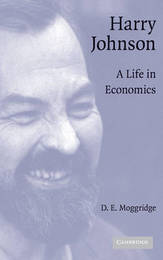
|
Harry Johnson: A Life in Economics
Hardback
Main Details
| Title |
Harry Johnson: A Life in Economics
|
| Authors and Contributors |
By (author) D. E. Moggridge
|
| Series | Historical Perspectives on Modern Economics |
|---|
| Physical Properties |
| Format:Hardback | | Pages:500 | | Dimensions(mm): Height 229,Width 152 |
|
| Category/Genre | Economic theory and philosophy |
|---|
| ISBN/Barcode |
9780521874823
|
| Classifications | Dewey:330.15 |
|---|
| Audience | | Professional & Vocational | |
|---|
|
Publishing Details |
| Publisher |
Cambridge University Press
|
| Imprint |
Cambridge University Press
|
| Publication Date |
21 April 2008 |
| Publication Country |
United Kingdom
|
Description
Harry Johnson (1923-1977) was such a striking figure in economics that Nobel Laureate James Tobin designated the third quarter of the twentieth century as 'the age of Johnson'. Johnson played a leading role in the development and extension of the Heckscher-Ohlin model of international trade. Within monetary economics he was also a seminal figure who identified and explained the links between the ideas of the major post-war innovators. His discussion of the issues that would benefit from further work set the profession's agenda for a generation. This book chronicles his intellectual development and his contributions to economics, economic education and the discussion of economic policy.
Author Biography
D. E. Moggridge has been professor of Economics at the University of Toronto since 1974. He previously served as a Research Fellow and Fellow of Clare College, Cambridge from 1967 to 1975. Professor Moggridge was invited by the Royal Economics Society in 1969 to be an editor of The Collected Writings of John Maynard Keynes, 30 volumes of which appeared between 1970 and 1989. His coeditor of the volumes was Elizabeth Johnson, wife of the subject of this book. Professor Moggridge is also the author of British Monetary Policy, 1924-1931 (Cambridge University Press, 1992), Keynes (1976, third edition 1993), and Maynard Keynes: An Economist's Biography (1992). He also coedited with Susan Howson The Wartime Diaries of Lionel Robbins and James Meade, 1943-45 (1990) and The Cabinet Office Diary of James Meade, 1944-46 (1990). Professor Moggridge served as President of the History of Economics Society in 1988-89 and has also served as Review Editor of History of Political Economy since 1988.
Reviews'This is a fascinating account of a larger-than-life figure, with seemingly boundless energy, who not only helped shape international economics in the 1950s and 1960s but also became a missionary for Chicago-style economics in Britain and elsewhere.' Roger E. Backhouse, University of Birmingham 'For 25 years Harry Johnson bestrode the international economics profession "like a Colossus". His influence was enormous. This book gives a thorough and very comprehensible account of his hectic life and work. A bonus is its inside picture of two famous institutions: the London School of Economics and the Milton Friedman dominated economics department of the University of Chicago.' Max Corden, Johns Hopkins University 'This fascinating book is a timely reminder of just how important Harry Johnson's work was for the development of late 20th century economics, not just as a body of knowledge, but also and crucially as a single discipline with a global reach. Don Moggridge has a deep understanding of the social and professional environment that helped shape Johnson's attractive but complicated personality and he tells the ultimately tragic story of his life and work with unobtrusive skill.' David Laidler, University of Western Ontario 'Don Moggridge's exceptional biography brings Harry Johnson alive for those of us who knew him only through his writings and public lectures. With his career spanning the decades of the development of economics as a science in the postwar period, Johnson's intellectual journey is equally a story of the creation of modern economics, both scientifically and institutionally. From his youth in Canada, to his time in Cambridge and Manchester, to his Chicago and LSE days, Johnson left a rich record of documents, memoirs, and personal connections. Moggridge has woven that material into a compelling narrative, a worthy successor to his acclaimed biography of Keynes. For economists, and historians of economics, and indeed for historians of postwar social science more generally, this is a must read.' E. Roy Weintraub, Duke University
|